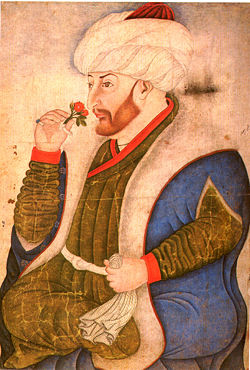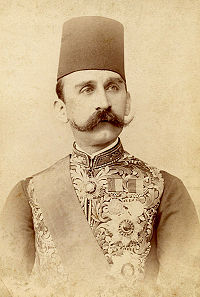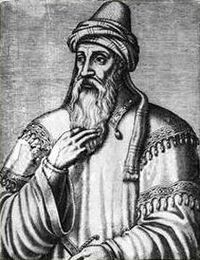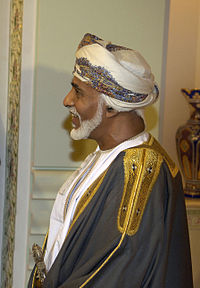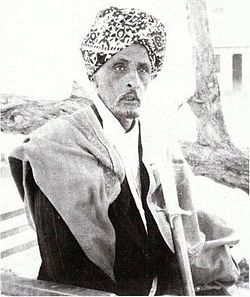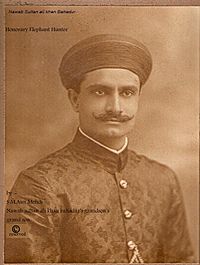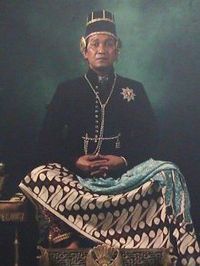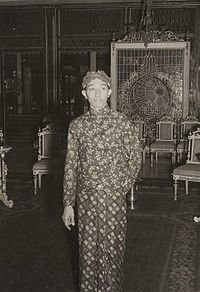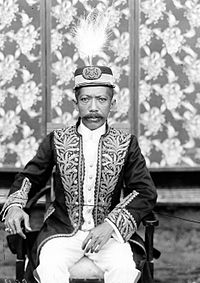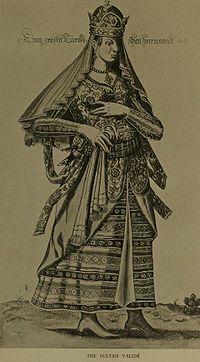- Sultan
-
Sultan (pronounced [ˈsulˈtˤɑːn]; Arabic: سلطان Sulṭān) is a title with several historical meanings. Originally, it was an Arabic language abstract noun meaning "strength", "authority", "rulership", and "dictatorship", derived from the masdar سلطة sulṭah, meaning "authority" or "power". Later, it came to be used as the title of certain rulers who claimed almost full sovereignty in practical terms (i.e. the lack of dependence on any higher ruler), without claiming the overall caliphate, or it was used to refer to a powerful governor of a province within the caliphate.
The dynasty and lands ruled by a sultan are referred to as a sultanate (Arabic: سلطنة).
Contents
Muslim ruler under the terms of shariah (King/Prince)
The title carries moral weight and religious authority, in the Qur'an. The sultan, however, is not a religious teacher himself, and in constitutional monarchies, the sultanship can be reduced to a more limited role.
The first to title of Sultan was the Ghazni ruler Mahmud Ghaznawi (ruled 998 - 1030 CE). Later, "sultan" became the usual title of rulers of Seljuk and Ottoman Turks and Ayyubid and Mamluk rulers in Egypt. The religious validation of the title was illustrated by the fact that the shadow Caliph in Cairo bestowed the title "Sultan" on Murad I, the third ruler of the emerging Ottoman Empire in 1383; its earlier sovereigns had been beys or emirs, a lower rank in the orders of protocol.
At later stages, lesser rulers assumed the title Sultan, as was the case for the earlier leaders of today's royal family of Morocco. Today, only the Sultan of Oman, the Sultan of Brunei (both sovereign nations), the Sultans of Johor, Kedah, Kelantan, Pahang, Perak, Selangor and Terengganu (within the constitutive states of the federation) in Malaysia, and the titular sultans of Sulu, Maguindanao , and Lanao Provinces in the southern Philippines and Java (Indonesia) regions still use the title or the Maharaja title. The sultan's domain is properly called a sultanate.
A feminine form, used by Westerners, is sultana or sultanah; the very styling misconstrues the roles of wives of sultans. In a similar usage, the wife of a German Field-Marshal might be styled Feldmarschallin (in French, similar constructions of the type madame la maréchalle are quite common). The rare female leaders in Muslim history are correctly known as "sultanas". In the Sultanate of Sulu, the wife of the Sultan is styled as the "Panguian", not "sultana".
Among those modern hereditary rulers who wish to emphasize their secular authority under the rule of law, the term is gradually being replaced by king (i.e., malik in Arabic).
Compound ruler titles
These are generally secondary titles, either lofty 'poetry' or with a message; e.g.:
- Mani Sultan = Manney Sultan, meaning 'the Pearl of Rulers', or less poetically Honoured Monarch, was a subsidiary title, part of the full style of the Maharaja of Travancore
- Sultan of Sultans is the 'sultanic equivalent' of King of Kings
- Certain secondary titles have a devout Islamic connotation, e.g., Sultan ul-Mujahidin as champion of jihad (To strive and to struggle in the name of Allah)
- Sultanic Highness was a rare, hybrid western-Islamic honorific style, exclusively used by the son, daughter-in-law and daughters of Sultan Hussein Kamel of Egypt (a British protectorate since 1914), who bore it with their primary titles of Prince (Arabic: Amir; Turkish: Prens) or Princess, after 11 October 1917. They enjoyed these for life, even after the Royal Rescript regulating the styles and titles of the Royal House after Egypt's independence in 1922, when the sons and daughters of the newly styled King (Arabic: Malik Misr, considered a promotion) were granted the title Sahib(at) us-Sumuw al-Malaki, or Royal Highness.
Former Sultans and Sultanates
Near East and Central Asia
- Ghaznavid Sultanate
- Sultans of Great Seljuk
- Seljuk Sultanate of Rum
- Sultans (becoming Padishahs) of the Ottoman Empire, the Osmanli
Arab World
- in Algeria: sultanate of Tuggurt
- in Egypt and Syria:
- Ayyubid Sultans
- Mamluk Sultans
- in present-day Yemen, various small sultanates of the former British Aden Protectorate and South Arabia:
-
- Audhali, Fadhli, Haushabi, Kathiri, Lahej, Lower Aulaqi, Lower Yafa, Mahra, Qu'aiti, Subeihi, Upper Aulaqi, Upper Yafa and the Wahidi sultanates
- in present-day Saudi Arabia :
- Oman – Sultan of Oman (authentically referred to as Hami), on the southern coast of the Arabian peninsula, still an independent sultanate, since 1744 (assumed the formal title of Sultan in 1861)
- Sultanate of Zanzibar two incumbents (from the Omani dynasty) since the de facto separation from Oman in 1806, the last assumed the title Sultan in 1861 at the formal separation under British auspices; since 1964 union with Tanganyika part of Tanzania)
- in Morocco, till Mohammed V changed the style to Malik (king) on 14 August 1957, maintaining the subsidiary style Amir al-Mu´minin (Commander of the Faithful)
- in Sudan:
- in Chad:
Horn of Africa
- Adal Sultanate, in northwestern Somalia, southern Djibouti, and the Somali, Oromia, and Afar regions of Ethiopia
- Ajuuraan State, in Somalia
- Afar Sultanate, in northeastern Ethiopia
- Geledi Sultanate, in Somalia
- Harar Sultanate, in eastern Ethiopia
- Ifat Sultanate, in eastern Ethiopia
- Majeerteen Sultanate, in northern Somalia
- Marehan Sultanate, in northern Somalia
- Shewa Sultanate, in central Ethiopia
- Sultanate of Hobyo, in Somalia
- Warsangali Sultanate, in northern Somalia
East Africa and Indian Ocean
Sultan
- Angoche Sultanate, on the Mozambiquan coast (also several neighbouring sheikdoms)
- various Sultans on the Comoros; however on the Comoros, the normally used styles were alternative native titles, including Mfalme, Phany or Jambé and the 'hegemonic' title Sultani tibe
- the Maore (or Mawuti) sultanate on Mayotte (separated from the Comoros)
Maliki
This was the alternative native style (apparently derived from malik, the Arabic word for king) of the Sultans of the Kilwa Sultanate, in Tanganyika (presently the continental part of Tanzania).
Swahili sultan
Mfalume is the (Ki)Swahili title of various native Muslim rulers, generally rendered in Arabic and in western languages as Sultan:
- in Kenya:
- Pate on part of Pate island (capital also named Pate), in the Lamu Archipelago
- Witu, came under German, then British protectorate
- in Tanganyika (presently part of Tanzania): of Hadimu, on the island of that name; also styled Jembe
Sultani
This was the native ruler's title in the Tanzanian state of Uhehe a female sultan
West and Central Africa
- in Cameroon:
- Bamoun (Bamun, 17th cent. founded uniting 17 chieftancies) 1918 becomes a Sultanate, but in 1923 re-divided into the 17 original chieftancies.
- Bibemi 1770 founded- Rulers first style Lamido to ...., then Sultan
- Mandara Sultanate since 1715 (replacing Wandala kingdom); 1902 Part of Cameroon
- Rey Bouba Sultanate founded 1804
- in the Central African Republic:
- Bangassou created ca.1878; 14 June 1890 under Congo Free State protectorate, 1894 under French protectorate; 1917 Sultanate suppressed by the French.
- Dar al-Kuti - French protectorate since December 12, 1897
- Rafai ca.1875 Sultanate, 8 April 1892 under Congo Free State protectorate, March 31, 1909 under French protectorate; 1939 Sultanate suppressed
- Zemio ca.1872 established; December 11, 1894 under Congo Free State protectorate, April 12, 1909 under French protectorate; 1923 Sultanate suppressed
- in Niger: Arabic alternative title of the following autochthonous rulers:
- the Amenokal of the Aïr confederation of Tuareg
- the Sarkin Damagaram since the 1731 founding of the Sultanate of Damagaram (Zinder)
- in Nigeria most monarchies previously had native titles but when most in the north converted to Islam, Muslim titles were generally adopted such as Emir; Sultan has also been used.
Southern Asia
In India:
- Bahmani Sultanate
- Sultanate of Bengal
- the Deccan sultanates: Berar, Bidar, Bijapur, Golconda and Ahmednagar
- Sultanate of Delhi several dynasties, the last (Mughal) became imperial Padshah-i Hind
- Sultanate of Gujarat
- Sultanate of Jaunpur
- Sultanate of Kandesh
- Sultanate of Malwa
In the Maldives:
Southeast and East Asia
In Indonesia (formerly in the Dutch East Indies):
.
.
- On Borneo
- Sultanate of Banjar
- Sultanate of Berau
- Sultanate of Bulungan
- Sultanate of Gunung Tabur
- Sultanate of Kubu
- Sultanate of Kutai Kartanegara
- Sultanate of Mempawah
- Sultanate of Paser
- Sultanate of Pontianak
- Sultanate of Sambaliung
- Sultanate of Sambas
- On Celebes Island
- Sultanate of Buton
- Sultanate of Bone
- Sultanate of Gowa
- Sultanate of Luwu
- Sultanate of Soppeng
- Sultanate of Wajo
- On Java Island
- Sultanate of Banten
- Sultanate of Cirebon- the rulers in three of the four palaces (kraton) from which fractioned Cirebon was ruled: Kraton Kasepuhan, Kraton Kanoman and Kraton Kacirebonan (only in Kraton Kaprabonan the ruler's title was Panembahan)
- Sultanate of Demak
- Sultanate of Pajang
- Sumedang Larang Kingdom
- Sultanate of Mataram
- Sultanate of Yogyakarta
- Sultanate of Surakarta
- On Madura island: Pamekasan
- In the Moluccas Archipelago
- Sultanate of Iha (Saparua)
- Sultanate of Honimoa/ Siri Sori (Saparua)
- Sultanate of Huamual (West Seram)
- Sultanate of Tanah Hitu (Ambon)
- Sultanate of Ternate
- Sultanate of Tidore
- Sultanate of Bacan
- Sultanate of Jilolo
- Sultanate of Loloda latter occupied by Ternate
- In the Nusa Tenggara
- Sultanate of Bima on Sumbawa island
- In the Riau archipelago: sultanate of Lingga-Riau by secession in 1818 under the expelled sultan of Johore (on Malaya) Sultan Abdul Rahman Muadzam Syah ibni al-Marhum Sultan Mahmud
- In Sumatra
- Sultanate of Aceh (full style Sultan Berdaulat Zillullah fil-Alam) , which had many vassal states
- Sultanate of Asahan
- Awak Sungai, established 17th century at the split in four of Minangkabau, in 1816 extinguished by Netherlands East Indies colonial government
- Sultanate of Deli since 1814, earlier Aceh's vassal as Aru
- Sultanate of Indragiri
- Sultanate of Langkat since 1817 (previous style Rajah)
- Sultanate of Palembang (Darussalam), also holding the higher title of Susuhunan
- Sultanate of Pagaruyung
- Sultanate of Pelalawan
- Sultanate of Perlak
- Sultanate of Riau-Lingga
- Sultanate of Samudera Pasai
- Sultanate of Serdang
- Sultanate of Siak Sri Inderapura
In the Peninsular Malaysia:
- In Peninsular Malaysia or Malaya, where all nine of Malaysia's present sultanates are located:
- Sultanate of Malacca
- Sultanate of Johor
- Sultanate of Kedah
- Sultanate of Kelantan
- Sultanate of Pahang
- Sultanate of Perak
- Sultanate of Selangor
- Sultanate of Terengganu
- Furthermore, the ruler of Luak Jelebu, one of the constitutive states of the Negeri Sembilan confederation, had the style Sultan in addition to his principal title Undang Luak Jelebu.
In Brunei:
- Sultan of Brunei, Brunei (on Borneo island)
In China:
- Dali, Yunnan, capital of the short-lived Panthay Rebellion
- Furthermore, the Qa´id Jami al-Muslimin (Leader of the Community of Muslims) of Pingnan Guo ("Pacified South State", a major Islamic rebellious polity in western Yunnan province) is usually referred to in foreign sources as Sultan.
In the Philippines:
- Sultanate of Sulu
- Sultanate of Buayan
- Sultanate of Maguindanao
- Sultanate of Sulu (Sulu, Basilan, Palawan and Tawi-Tawi islands and part of Sabah on North Borneo)
- Sultanate of Ranaw (Sultan ko Pat a Pangampong a Ranao)
- Sultanates of Lanao
In Thailand (Siam):
- Sultanate of Patani
- Sultanate of Singgora
Contemporary sovereign sultanates
- Brunei
- Indonesia – Sultan of Yogyakarta Special Region is governor of that province
- Malaysia
- Sultan is the title of seven (Johor, Kedah, Kelantan, Pahang, Perak, Selangor and Terengganu) of the nine rulers of the Malay states. The federal head of state the Yang di-Pertuan Agong, is elected (de facto rotated) for five years by and among the hereditary state rulers, but is usually styled "king" in foreign countries; political power, however, lies with the prime minister. See also: Malay titles
- Oman, an Arabian nation, formerly sultanate of Muscat and Oman
Princely and aristocratic titles
In the Ottoman dynastic system, male descendants of the ruling Padishah (in the West also known as Great Sultan) enjoyed a style including Sultan; so this normally monarchic title is equivalent in use to the western Prince of the blood: Daulatlu Najabatlu Shahzada Sultan (given name) Hazretleri Effendi. For the Heir Apparent, however, the style was Daulatlu Najabatlu Vali Ahad-i-Sultanat (given name) Effendi Hazlatlari; i.e. Crown Prince of the Sultanate.
- The sons of Imperial Princesses, excluded from the Ottoman imperial succession, were only styled Sultan zada (given name) Bey-Effendi, i.e. Son of a Prince[ss] of the dynasty.
In certain Muslim states, Sultan was also an aristocratic title, as in the Tartar Astrakhan Khanate.
The Sultan Valide was the title reserved for the mother of the ruling sultan.
Military rank
In a number of post-caliphal states under Mongol or Turkic rule, there was a feudal type of military hierarchy, often decimal (mainly in larger empires), using originally princely titles (Khan, Malik, Amir) as mere rank denominations.
In the Persian empire, the rank of Sultan was roughly equivalent to a western Captain, socially in the fifth rank class, styled 'Ali Jah.
See also
Other ruling titles
- Aga-sultan or agha-sultan (ru:Ага-султан) - "big brother sultan", a title for major sultan in kazakh khandom under russian empire
- Emir (Amir)
- Atabeg
- Bey
- Caliph
- Datu
- Khan, Ilkhan and Khaqan
- Maharajah
- Malik
- Mir
- Padishah
- Shah and Shahanshah
Notes
References
Authoritarian forms of government Autocratic Absolute monarchy · Despotism · Dictatorship · Benevolent dictatorship · Enlightened absolutism · Tyranny
Totalitarian Other Illiberal democracy (Inverted totalitarianism · Totalitarian democracy) · Military dictatorship · Military junta · Oligarchy · Single-party state · Police state (Counterintelligence state)
Categories:- Arabic words and phrases
- Heads of state
- Islamic honorifics
- Military ranks
- Royal titles
- Noble titles
- Positions of authority
- Sultans
- Titles
- Turkish titles
- Titles of national or ethnic leadership
- Titles in Afghanistan
- Titles in Pakistan
- Titles in Iran
- Arabic loanwords
- Philippine Royalty and Nobility
Wikimedia Foundation. 2010.

